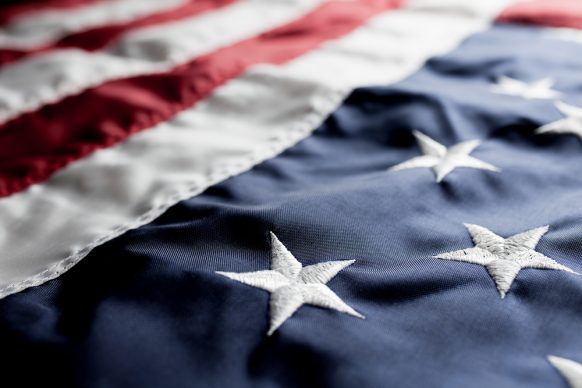On 14 May 2018, the US Supreme Court struck down the Professional and Amateur Sports Protection Act of 1992 (PASPA) paving the way for the legalization of sports betting across the nation. But what exactly is PASPA, why was the bill introduced in the first place and how did the Supreme Court repeal it? Compare.bet has everything you need to know in a comprehensive overview of PASPA and the repeal of the federal ban on sports betting.
What is PASPA?
The Professional and Amateur Sports Protection Act of 1992 (PASPA), also referred to as the Bradley Act, was a federal law with the aim of defining the legality of sports wagering in the US. PASPA itself did not explicitly outlaw sports wagering. Instead, the federal law made it illegal for a “governmental entity to sponsor, operate, advertise, promote, license, or authorize” sports betting. While this may seem like very specific wording, it was this exact phrasing that led to the repeal of federal law in 2018.
Signed into law by President George W Bush on 28 October 1992, PASPA essentially outlawed sports wagering across the US. A handful of states that already offered sports betting were exempt from the Act, but the bill also included a one-year window in which other states could legalize sports betting to gain exemption from PASPA.
Nevada, Delaware, Montana and Oregon all offered some form of legal sports betting prior to PASPA’s passage. Nevada held a monopoly on single-game wagering while the other three states offered residents several sports betting options.
The sports betting options in these four states varied. Delaware ran the Delaware Sports Lottery, a game offered by the state Lottery where residents could place parlay-style bets on the outcomes of NFL games. The Oregon Lottery ran several Sports Action games which permitted parlay-style bets on NBA and NFL events, though NBA games were discontinued in 1990 and the NFL games in 2007. Montana also ran sports pools and a handful of betting squares games in which residents could wager on the outcome of different sporting events.
The games in Delaware, Montana and Oregon were a far cry from traditional sports wagering, as bettors could only make parlay bets. Residents in these states could not make proposition bets, in-play bets or even single-game wagers. Even in Nevada, where single-game sports betting was permitted, bettors would be required to visit a licensed casino sportsbook in order to place a wager legally.
Why was PASPA introduced?
PASPA was initially introduced as a measure to prevent the regulation and legalization of sports wagering. The federal bill received almost unanimous support from the major sporting leagues (NBA, NHL, NFL and MLB) who have historically been opposed to sports wagering on the grounds that gambling and bribery scandals pose a threat to the integrity of their games. The leagues saw PASPA as a means of outlawing sports betting to preserve this integrity.
Unfortunately, PASPA didn’t achieve this. Instead, the federal ban, which was in place for 25 years, created an environment in which underground bookies and the unregulated and illegal offshore wagering market could flourish. According to a report from the American Gaming Association (AGA), over $150bn was wagered illegally at offshore sites every year despite the ban.
Striking PASPA down
The first challenge to the federal law came when New Jersey attempted to legalize sports wagering. In 2011, voters in the Garden State approved a constitutional amendment that would legalize sports betting within state lines. Lawmakers sent the bill to Governor Chris Christie, who signed the Sports Wagering Act into law in January 2012.
In August 2012, the four major sports leagues, as well as the National Collegiate Athletic Association (NCAA), joined forces to sue New Jersey and prevent the sports betting law from taking effect. This led to a six-year-long legal battle with the Garden State, citing PASPA in its lawsuit. The US Department of Justice also sided with the leagues.
New Jersey acknowledged that the Sports Wagering Act violated PASPA, but argued that PASPA violated the Tenth Amendment of the US Constitution as it stripped the states of the power to govern their own industry in that it prohibited them from passing individual sports betting legislation.
In February 2013, the US District Judge for the District of New Jersey ruled against the Garden State and placed an injunction on the state preventing the enactment of the law in 2012. New Jersey attempted to appeal the injunction but was ultimately unsuccessful.
The Sports Wagering Act of 2012 continued to receive multiple amendments in an effort to legalize sports wagering, but all were unsuccessful. However, in 2014, Governor Chris Christie came out in support of the sports betting bill and signed the legislation into law.
This also caught the attention of the leagues which led to them suing New Jersey once again, with a District Court and Third Circuit Court ruling in favor of the leagues.
In response to this, the state of New Jersey petitioned the Supreme Court for a writ of certiorari or a judicial review. The Supreme Court agreed to hear the case and set a date for 2017. This case was combined with another case which involved the Jersey Thoroughbred Horsemen’s Association (NJTHA) petitioning the Supreme Court to allow sports betting at the Monmouth Park Racetrack.
The legal proceedings came to a head on 14 May 2018 when the Court reached a decision on the legality of PASPA. In a vote of 7-2, the Supreme Court ruled that PASPA did, in fact, violate the Tenth Amendment as it commandeered power from the states to regulate their own gambling industries.
This spelt the end for PASPA and made it legal for each state in the US to legalize sports wagering if they wished.
Where is sports betting legal?
Although PASPA is no more, not every state has legalized sports betting. At the time of writing, these eight states have legalized and regulated sports betting markets:
Out of these states, only Nevada, New Jersey, Pennsylvania and West Virginia have launched online and mobile sports betting operations. In these states, you must be located within state lines and meet state age requirements to make online bets. While there are several states awaiting the launch of online betting, most expect to have online betting in time for the 2025 football season.
While other states continue to move towards legalizing sports betting, a handful of states have legalized sports betting and are on track to launch in the coming months. The following jurisdictions have legalized sports betting and are currently pending launch:
Several other states are also exploring the possibility of legalizing sports betting in some capacity.
Not all states will legalize sports betting
While PASPA no longer applies on a federal level, each state has its own laws, regulations, principles and attitudes to consider before legalizing sports betting. Taxation, online betting, morality and native gambling tribes are just some of these factors.
Taxation plays a key role when it comes to the legalization and regulation of sports betting. State lawmakers must establish a balance between generating sufficient tax revenue while also encouraging market growth. However, state governments must also consider the morality of generating tax dollars from an activity that could potentially harm vulnerable people, such as minors and those at risk of gambling addiction.
In certain states, gambling tribes are engaged in compacts (legally binding agreements) with the state government. If a state wants to legalize sports betting, it will need to consider how commercial gambling fits affects the Native American gambling industry and renegotiate its compacts with any gambling tribes in that jurisdiction.
Online and mobile wagering is another area of consideration, even in states that have legalized land-based sports betting since the PASPA repeal. While online betting sites and mobile betting apps allow a wider audience to participate in sports betting, they also raise another issue when it comes to the regulation and monitoring of sport betting.
While only a handful of states currently offer legal and regulated sports betting, the number of States that offer sports betting is expected to grow. According to a 2018 report from Gambling Compliance, the US sports betting market is expected to grow to $5.7bn in annual revenue, with 34 states offering the activity by 2024.
FAQs
Is it legal to bet on international sporting events?
Yes, as long as sports betting is legal in your state. PASPA prohibited all types of sports betting, be that on US or international events. Since the PASPA repeal, residents in states with legal sports betting can wager on a wide variety of sports events around the world. Some of the most popular events to bet on include international golf tournaments, soccer leagues, and tennis games.
Is it legal to bet on college sporting events?
This depends on the state you’re in.The PASPA repeal paved the way for each state to legalize and regulate sports betting on an individual basis, meaning it’s up to each state to decide how sports betting works there. These laws vary between states. For example, New Jersey prohibits bookies in the state from taking bets on New Jersey college teams and college events played within state lines.
Is it legal to bet on non-sporting events?
Not currently. The PASPA repeal only applies to sports betting. However, in a one-off event, the New Jersey state regulator allowed sportsbooks in the Garden State to take bets on the 91st Academy Award ceremony in February 2019. This was the first non-sporting event US residents could legally wager on and, despite its success, betting markets for non-sporting events are not widely available.
Are offshore betting sites still illegal?
Yes. Even after the repeal of PASPA, offshore betting sites remain unlicensed and unregulated making them illegal in the US. This means sites aren’t monitored in the same way as licensed betting sites, meaning they are not subject to industry standard security and safety and player protection measures.


